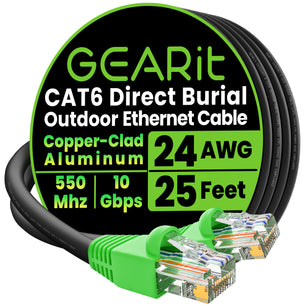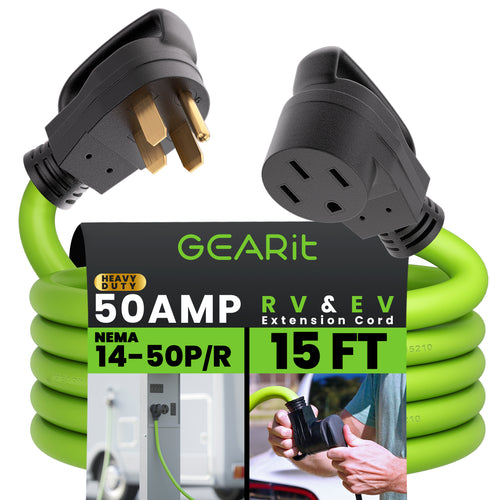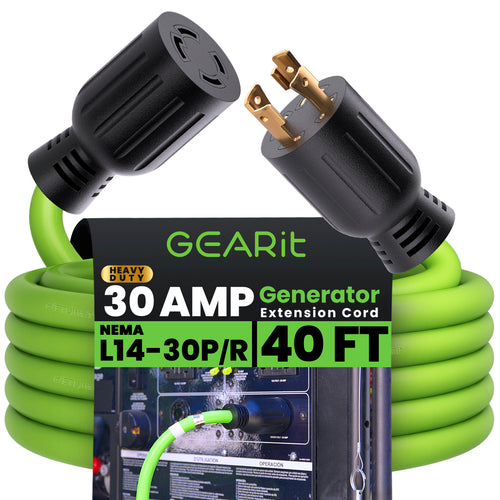
Choosing the right extension cord for your RV or electric vehicle (EV) is crucial for ensuring safety and efficiency. The two most common options are 30 Amp and 50 Amp extension cords. Let’s break down how to determine which one is best for your specific needs.
Understanding Amperage
First, let's talk about what amperage means. Amperage, or amps, measures the amount of electrical current flowing through a circuit. The higher the amps, the more power can be delivered to your devices.
30 Amp Extension Cords
50 Amp Extension Cords
Choosing the Right Extension Cord for Your RV
RV Power Needs
1. Check Your RV's Power Requirements: Look at the power cord coming out of your RV. A 30 Amp RV will have a three-prong plug, while a 50 Amp RV will have a four-prong plug.
2. Consider Your Appliances: Larger RVs with more appliances (air conditioners, microwaves, etc.) typically require 50 amps. Smaller RVs with fewer appliances can usually get by with 30 amps.
3. Future-Proofing: If you plan on upgrading your RV or adding more appliances in the future, it might be worth investing in a 50 Amp extension cord now.
RV Camping and Hookups
1. Campground Hookups: Most campgrounds offer both 30 Amp and 50 Amp hookups. If you have a 50 Amp RV, you can still plug into a 30 Amp outlet using an adapter, but you won’t be able to use all your appliances simultaneously.
2. Cable Length: Consider the distance from the power source to your RV. Extension cords come in various lengths, and longer cords can result in power drop, especially if you're using a 30 Amp cord for a 50 Amp RV.
Choosing the Right Extension Cord for Your EV
EV Charging Needs
1. Check Your EV’s Charging Specifications: Refer to your EV's manual to determine the required amperage for optimal charging. Most home EV chargers use 30 Amp or 50 Amp connections.
2. Charging Speed: A 50 Amp cord can deliver more power, charging your EV faster than a 30 Amp cord. If you need faster charging, opt for the 50 Amp cord.
3. Home Electrical System: Ensure your home’s electrical system can support the chosen amperage. Upgrading to a 50 Amp circuit might require professional installation and potentially higher costs.
Home and Public Charging Stations
1. Home Charging Setup: If you’re setting up a home charging station, match the cord to your EV charger’s requirements. Many Level 2 chargers use 50 Amp connections.
2. Public Charging Compatibility: While most public charging stations are designed to accommodate various charging levels, having the right extension cord can provide flexibility when needed.
Safety Considerations
1. Quality and Durability: Invest in high-quality extension cords with proper insulation and weather resistance, especially for outdoor use.
2. Avoid Overloading: Never use a 30 Amp cord for a 50 Amp RV or EV, as this can cause overheating and potential fire hazards.
3. Regular Inspections: Periodically check your cords for signs of wear, fraying, or damage, and replace them if necessary.
Finding The Right Size
Choosing between a 30 Amp and a 50 Amp extension cord for your RV or EV depends on your specific power needs and future plans. For smaller RVs and basic EV charging, a 30 Amp cord is usually sufficient. However, for larger RVs, motorhomes, and faster EV charging, a 50 Amp cord is the better choice. Always prioritize safety by using the appropriate cord and regularly inspecting it for wear and tear. With the right extension cords, you can ensure a reliable and efficient power supply for all your adventures.
Check out our curated recommendations of products from this article below. When you order through our website, you’re supporting a small business and getting some great perks like personalized customer service, special discounts, and fast shipping. Plus, our team is always here to help with any questions or concerns you might have.


























































